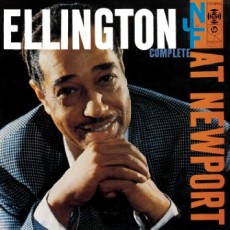
Daily Dose Of Jazz…
Duke Ellington was born Edward Kennedy Ellington on April 29, 1899 in Washington, D.C. to parents who were pianists with his mother primarily playing parlor songs and his father preferring operatic arias. At the age of seven, he began taking piano lessons from Marietta Clinkscales. Surrounded by dignified women who reinforced his manners and taught him to live elegantly, his childhood friends noticed that his casual, offhand manner, easy grace and dapper dress and began calling him “Duke”.
Though Ellington took piano lessons, he was more interested in baseball. Ellington went to Armstrong Technical High School in Washington, D.C. and his first job was selling peanuts at the Washington Senators baseball games. Sneaking into Frank Holiday’s Poolroom at the age of fourteen and hearing the poolroom pianists play ignited Duke’s love for the instrument, and he began to take his piano studies seriously. But in the summer of 1914, while working as a soda jerk at the Poodle Dog Cafe he wrote his first composition, Soda Fountain Rag, created by ear, as he had not yet learned to read and write music.
He took private lessons in harmony from Dunbar High School music teacher Henry Lee Grant and with guidance of pianist and bandleader Oliver “Doc” Perry, he learned to read sheet music, project a professional style, and improve his technique. He was equally inspired by his encounters with James P. Johnson, Lukey Roberts, Will Marion Cook, Fats Waller and Sidney Bechet.
Playing gigs in cafés and clubs around D.C. and working as a freelance sign-painter, in 1917 Ellington began assembling groups to play for dances beginning with The Duke Serenaders. His group ventured to Harlem joining Wilber Sweatman’s orchestra, becoming a part of the Renaissance. Striking out on their own they hit roadblocks and though Willie “The Lion” Smith introduced them to the scene and gave them some money, they ultimately returned to D.C. discouraged.
A 1923 gig in Atlantic City, New Jersey led to the prestigious Exclusive Club in Harlem, followed by the Hollywood Club and a four-year engagement, giving Ellington a solid artistic base. He would go on to lead The Washingtonians, record eight records, contribute four songs to the 1925 all-Black revue Chocolate Kiddies starring Lottie Gee and Adelaide Hall, and struck an agreement of 45% interest in his future with agent-publisher Irving Mills. He would record on nearly every label at the time giving him popular recognition.
In 1927 he began his engagement at the Cotton Club receiving national attention from weekly radio broadcasts from the club gave Ellington national exposure. He gained worldwide recognition with Adelaide Hall on Creole Love Call and Black and Tan composed by Bubber Miley. He would go on to play for Florenz Ziegfeld, compose music for film scores, hire Ivie Anderson and create hits It Don’t Mean A Thing If It Ain’t Got That Swing, Mood Indigo, Sophisticated Lady, Solitude and In A Sentimental Mood.
By the 1930s as the Depression worsened, Duke was still able to produce music and continue a high profile with his radio broadcasts. He had hits like Caravan and I Let a Song Go Out of My Heart. His short film Symphony In Black introduced Billie Holiday on A Rhapsody of Negro Life, winning an Academy Award for Best Musical Short Subject.
In 1939 he began his association with Billy Strayhorn and the stage turned up again with more great music collaborations, such as Take The “A” Train. Among the musicians in Duke’s orchestra at one time or another were Ben Webster, Cootie Williams, Ray Nance, Johnny Hodges, Jimmy Blanton, Herb Jeffries, Al Hibbler, Mary Lou Williams, Sonny Greer, Clark Terry, Louie Bellson, and many others to numerous to mention here.
Ellington’s appearance at the Newport Jazz Festival on July 7, 1956 returned him to wider prominence and introduced him to a new generation of fans with Paul Gonsalves’ 27-chorus marathon solo, culminating in an album release.
Over the next two decades Duke continued to tour, compose and record, have statues erected, schools , streets, parks, buildings and bridges named for him, and a coin and a stamp honoring him. He has an annual competition, The Essentially Ellington High School Jazz Competition and Festival at Jazz At Lincoln Center, has a star on the Hollywood Walk of Stars, was awarded a special Pulitzer Prize, received a Presidential Medal of Freedom, a Grammy Lifetime Achievement Award, Legion Of Honor from France, won 12 Grammy Awards, and has nine songs inducted into the Grammy Hall of Fame among too many to list.
Pianist, bandleader and composer Duke Ellington, who composed to the very last days of his life and never came off the road, passed away on May 24, 1974 of complications from lung cancer and pneumonia, a few weeks after his 75th birthday.
![]()
More Posts: piano


